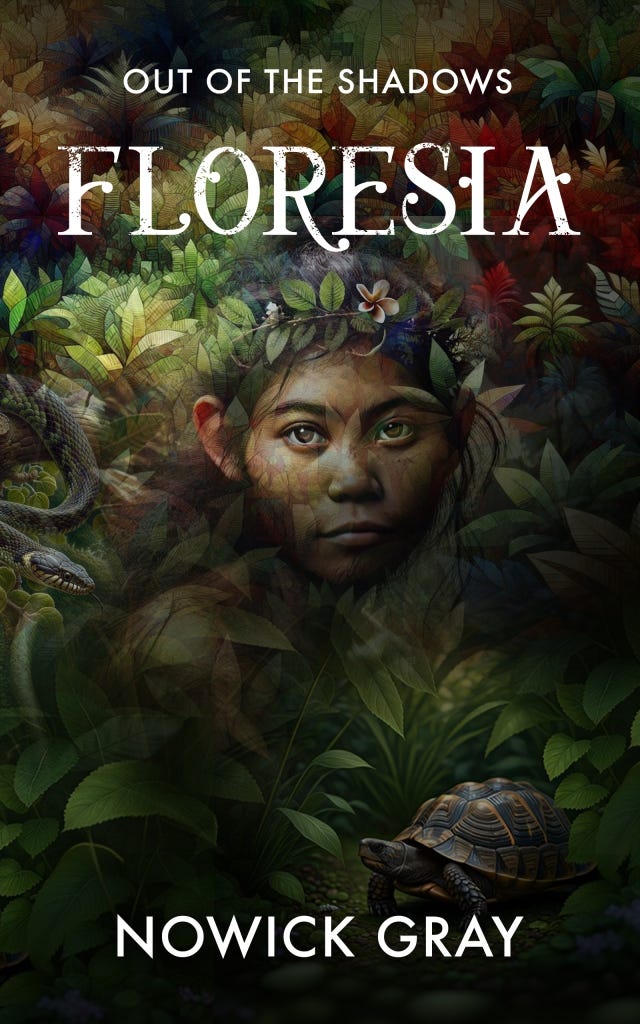Floresia: Out of the Shadows, a newly-published novel by Nowick Gray, whose work we featured in The Acorn in 2023, has set me dreaming. [1][2]
I dream not of the strange and distant world that he describes, but of a “homeland I have come to find again, of hidden bones of ancestors, peace of the ancient days”. [3]
I dream of the life I might have lived, should have lived, had our world not been gutted and defiled by the industrial demonocracy.
How I would love to have been born – here in Europe rather than in the Indonesian island of Gray’s fiction – into the kind of Garden of Eden he depicts, a paradisical living to the rhythms of nature that had gone on, unchanged and in the same place, for a million years.
He writes: “Floresians had no timeline, only circular calendar, the daily round. No duty but to nature, the life of the forest and seashore, mountain and plain. Undisciplined, by self or others, only taught by experience, witness and survival. Attentive to what was around, what might come next — as legends instruct, and dreams may tell. [4]
“Our race was content, to laze beneath these hardwoods, the beauty of teak, mahogany alive and regal, home as well to a thousand other living beings, moving in our circular motion apart from the ravages of time, rather contained within her womb”. [5]
The holistic wisdom received and expressed by Gray’s central character is obviously his own, although she is a young woman of a forgotten race whose world and desires have been conjured into existence by his remarkably vivid imagination.
“As without, so within. You observe how these trees around us, and the gaudy cockatoos and butterflies that flit through the branches, the creatures that creep on its floor, the largest and the tiniest, all conspire to create this one great organism.
“So it is within the forest of the body, with its own terrain and cycles, its own rivers of nutrient and waste, its own intelligence and balance”. [6]
Floresia’s withness to the earth, to the soil, to physical reality, is laced with Gray’s sad yearning for all we have lost in this concrete modern desert.
“I tread on a layer of leaves on the trail, the past underfoot. In my live limbs moving forward, I am the dance of time. Everything past — origin story, the forgotten land, the way it was — is written upon this ground”. [7]
But even this fictional paradise cannot last for ever: it comes under attack from archetypal supremacist invaders, here called the El.
“Over every gratitude, every traditional practice and pleasure, hung the shadow of the El”, we learn. [8]
“The El themselves surely are not gods, they are human like us, if they would only recognize it. Instead, they seem compelled to prove they are superior, dominant, without equal or peer. As though chosen to prevail”. [9]
“They prove once again they are heartless killers, murderers of men, rapers of women and captors of children, yes even cookers of our kind, if the old tales are true”. [10]
And Gray has an crucial message to impart to us via Floresia: “I say don’t weep for me, but look to your own fate. Will this freedom I speak of also be lost to you forever? If you hear me, I think not.
“Because we both know that freedom is a well as deep as the earth. Even when you are gone, it will run, tapping roots core deep. So while you are on this precious earth, please use it”. [11]
[1] Nowick Gray, Floresia: Out of the Shadows (Salt Spring Island, BC: Cougar Webworks, 2025). All subsequent page references are to that work.
[2] https://winteroak.org.uk/2023/01/01/the-acorn-79/
[3] p. 104.
[4] pp 16-17.
[5] pp. 62-63.
[6] p. 38.
[7] p. 60.
[8] p. 89.
[9] p. 36.
[10] p. 63.
[11] p. 160.
More info on the book can be found here and here and it can be ordered here.







Sounds a little like how I remember Atlantis. Except if it's set in Indonesia then it's perhaps more like Mu/Lemuria.
Humanity has, of course - at least for the most part - only forgotten all of this - their true roots, I mean.
I do have a theory about that, which, put simply, is that up until relatively recently in human history, which is at least 300k years old, for around 98% of that time there were never more than around 80 million, or 1% of the current population. Those 1% have experienced several thousand reincarnations over that time, growing and evolving as they go. Then around 6k years ago the population increases, so we have maybe a further 10% who've had, say, 60 lifetimes. Then, more recently, the population didn't reach 1 billion until around 100 or so years ago, meaning that 7 billion of current humans have only had 1 or 2 lifetimes in a human. So these are babies, or even embryos, perhaps. The 10%, however, they've had enough lifetimes to sort of understand what it's like, but then they see us, the 1%, and understand how much more evolved and spiritual we are, in an effortless way, and they become bitter and resentful, and thus become the current 'criminocracy' - they perhaps hate us more than they hate the 7 billion. Nietzsche had it absolutely right when he used the word 'resentment' (ressentiment) to encapsulate their motivation.
This is, in a very real way, an explanation for the ongoing war against the spirit, perpetrated by these monsters.
If I ever do get any disposable income, I think I shall have to buy this book. Thanks for the review, Paul. Lovely positive post, this one.
Inspiring!
As are the allegorical/metaphorical possibilities.